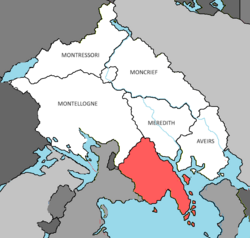Selleaux (province): Difference between revisions
(Created page with "{{Infobox settlement |native_name = Selleaux |image_flag = |alt_flag = |national_motto = |national_anthem = |image_map = Selleaux_location_in_Avergnon.png |alt_map = |map_caption = Selleaux in Avergnon | subdivision_type = Country | subdivision_name = {{flag|Avergnon}} | subdivision_type1 = Capital | subdivision_name1...") |
No edit summary |
||
| Line 30: | Line 30: | ||
}} | }} | ||
'''Selleaux''' is a province of [[Avergnon]] located in the southernmost region of the country, with a coastline along the [[Siena Bay]] and hosting a border with [[Shoassau]], the holy city of [[Montemera]], and [[Drambenburg]]. Its provincial capital, largest city, and namesake is [[Selleaux]], with other major cities including [[Monaford]], [[Eppelborn]], and [[Oftcote | '''Selleaux''' is a province of [[Avergnon]] located in the southernmost region of the country, with a coastline along the [[Siena Bay]] and hosting a border with [[Shoassau]], the holy city of [[Montemera]], and [[Drambenburg]]. The province has a population of 18.9 million people. Its provincial capital, largest city, and namesake is [[Selleaux]], with other major cities including [[Monaford]], [[Eppelborn]], and [[Oftcote]]. | ||
Selleaux has two main geographical regions: the coastal basin plain, and the fertile inland plain. The first consists mainly of sand dunes and clayey alluvial soils in the polders. Polders are areas of land, close to or below sea level that have been reclaimed from the sea, from which they are protected by dikes or, a little further inland, by fields that have been drained with canals. With similar soils along the lowermost basin starts the inland plain, a smooth, slowly rising fertile area irrigated by many waterways that reaches an average height of about five metres (16 feet) above sea level with wide valleys of its rivers upstream as well as the Meine region to the west along the Drambenburgian border having sandy soils at altitudes around thirty metres. | |||
Selleaux is well known for its vineyards and farmland, with larger vineyards often employing entire villages to cultivate and prune fields that are grown to keep pace with national and international demand of the famous [[Selleauxvian Wines]] | Selleaux is regarded as a cultural center of Avergnon and [[Euronia]], as its distinction from neighboring cultures have helped project a sense of nationality within the province. Selleaux is known as a center of knowledge, with many world class libraries, colleges, and debate houses located throughout the province. The province's vital connection to maritime industry makes it economically strategic for Avergnon, and shipping, manufacturing, and technology are key industries. Additionally, Selleaux has rich farmland and a thriving agricultural sector. Selleaux is well known for its vineyards and farmland, with larger vineyards often employing entire villages to cultivate and prune fields that are grown to keep pace with national and international demand of the famous [[Selleauxvian Wines]]. | ||
==Etymology== | ==Etymology== | ||
==Geography== | ==Geography== | ||
[[File:Picardy_countryside_(8930216616).jpg|thumb|left|Selleaux countryside]] | |||
==History== | ==History== | ||
Selleaux was invaded by Drambenburg in 1949, which began the [[World War (Iearth)|World War]]. The [[Battle of Selleaux (1949)|Battle of Selleaux]] is regarded as one of the bloodiest battles of the war, occurring in the first month of the conflict and claiming the lives of nearly 100,000 soldiers. | |||
==Government== | ==Government== | ||
==Demographics== | ==Demographics== | ||
Revision as of 18:29, 14 June 2024
Selleaux
Selleaux | |
|---|---|
 Selleaux in Avergnon | |
| Country | |
| Capital | Selleaux |
| Largest city | Selleaux |
| Population | |
| • Total | 18,878,200 |
Selleaux is a province of Avergnon located in the southernmost region of the country, with a coastline along the Siena Bay and hosting a border with Shoassau, the holy city of Montemera, and Drambenburg. The province has a population of 18.9 million people. Its provincial capital, largest city, and namesake is Selleaux, with other major cities including Monaford, Eppelborn, and Oftcote.
Selleaux has two main geographical regions: the coastal basin plain, and the fertile inland plain. The first consists mainly of sand dunes and clayey alluvial soils in the polders. Polders are areas of land, close to or below sea level that have been reclaimed from the sea, from which they are protected by dikes or, a little further inland, by fields that have been drained with canals. With similar soils along the lowermost basin starts the inland plain, a smooth, slowly rising fertile area irrigated by many waterways that reaches an average height of about five metres (16 feet) above sea level with wide valleys of its rivers upstream as well as the Meine region to the west along the Drambenburgian border having sandy soils at altitudes around thirty metres.
Selleaux is regarded as a cultural center of Avergnon and Euronia, as its distinction from neighboring cultures have helped project a sense of nationality within the province. Selleaux is known as a center of knowledge, with many world class libraries, colleges, and debate houses located throughout the province. The province's vital connection to maritime industry makes it economically strategic for Avergnon, and shipping, manufacturing, and technology are key industries. Additionally, Selleaux has rich farmland and a thriving agricultural sector. Selleaux is well known for its vineyards and farmland, with larger vineyards often employing entire villages to cultivate and prune fields that are grown to keep pace with national and international demand of the famous Selleauxvian Wines.
Etymology
Geography
History
Selleaux was invaded by Drambenburg in 1949, which began the World War. The Battle of Selleaux is regarded as one of the bloodiest battles of the war, occurring in the first month of the conflict and claiming the lives of nearly 100,000 soldiers.
